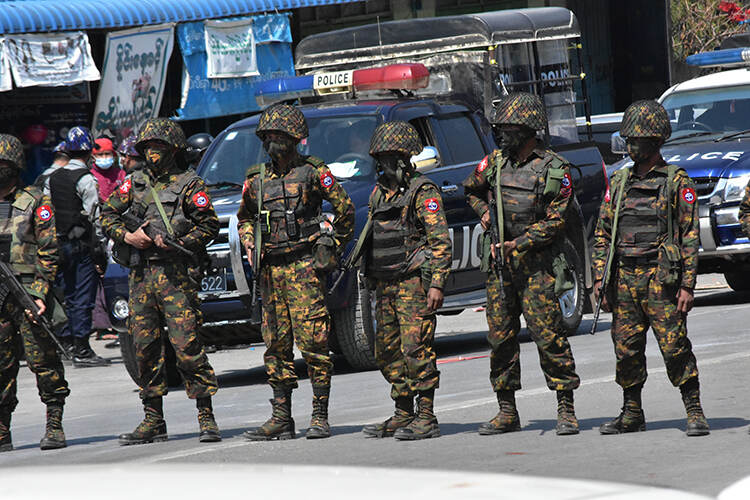
Tim Marshall on why China is likely to come out on top in this geopolitical rivalry

Geopolitical Hotspot
You’re the military dictator in Myanmar. You can have offers of friendship or condemnation; diplomatic relations or an appointment at the International Court of Justice; fighter jets or sanctions. Which are you going to choose?
It’s not a difficult decision for Commander-in-Chief Min Aung Hlaing, head of the Tatmadaw – Myanmar’s military. He led the February 2021 coup, which deposed the democratically elected government of Aung San Suu Kyi’s National League for Democracy. Since then, a nationwide armed insurgency by several ethnic groups has grown in intensity. The military leadership has reacted with increasing ferocity, including launching repeated airstrikes on villages and continuing the persecution of the Rohingya Muslims.
China offers friendship, ambassadors and fighter jets, which is why it will win the tug of war for the minds, if not the hearts, of the junta based in Myanmar’s capital, Naypyidaw. There are about one million people of Chinese origin in Myanmar, many of whom are among the economic elite and have close ties with the military government. The Americans can’t even dream of such access.
In June, Washington imposed its latest round of sanctions on Myanmar, targeting the defence ministry and two state-owned banks that it said were facilitating the junta’s weapons purchases (in this case, from Russia). The USA calls for an end to human rights abuses, a negotiated settlement of the conflict and, eventually, a democratic federal government. It holds out the carrots of diplomatic assistance in achieving these goals and investment after a return to democracy.
The Americans would like to have Myanmar onside as part of its ‘pivot’ to the Indo-Pacific and to block Chinese influence. At times, the junta (in previous iterations) has shown an interest in economic partnerships with Western investors. However, it’s a tough neighbourhood with a lot going on, and there’s only so much ‘bandwidth’ in any country’s foreign ministry. Washington views Myanmar as a secondary regional issue and is reluctant to drop its insistence on a return to democracy. Conversely, Naypyidaw’s dictatorship won’t cede power and so believes it can’t rely on the democratic countries to dig it out of its economic crisis. Last year, the economy shrank by 18 per cent and the country is now suffering soaring inflation.
Reluctantly, therefore, the junta looks to Beijing, which, in return, makes offers that Naypyidaw is in no position to refuse. July should see the completion of a survey assessing the environmental impact of a US$1.3 billion project to build a deep-water seaport and economic zone in the coastal city of Kyaukphu. Despite evidence that it will destroy natural habitats, fish stocks and livelihoods, the project will likely be approved. Once built (over 20 years), it will link Kyaukphu via road and rail across central Myanmar, up through mountainous Shan State and into the landlocked Chinese province of Yunnan 1,600 kilometres away. This link will give China direct access to the Indian Ocean, which will reduce both its shipping costs and its current reliance on the narrow and congested Strait of Malacca, through which most of its energy supplies pass and which it knows could be easily blockaded.
Shan State, which borders Yunnan, has always been the gateway for Chinese influence in Myanmar. Its Kokang region, which used to be part of China, is hard up against the border and mostly populated by ethnic Han Chinese, of whom there are about 150,000. One of the numerous ethnic groups fighting the Tatmadaw is the MNDAA, which is based in Kokang. Interestingly, the group has been receiving Chinese-made weapons via Yunnan, which suggests that Beijing might be keeping a foot in both camps to secure its long-term interests in creating the Myanmar corridor to the Indian Ocean. Following its facilitation of the Saudi/Iranian rapprochement and offers to mediate between Russia and Ukraine, it also means President Xi can position himself as a potential peacemaker in Myanmar.
Watching this with some alarm is India. It, too, won’t condemn the junta and has maintained diplomatic relations in a bid to prevent China from gaining too much influence. However, economically, it can’t match China’s firepower. Its GDP is around US$3.75 trillion, whereas China can boast above US$17 trillion. Myanmar? US$65 billion. Another easy choice for the Tatmadaw.
An easy choice for China as well. It adds Myanmar to the short but growing list of countries it can count on for diplomatic support, it blocks the Americans, gets access to the Indian Ocean and further builds out its now global Belt and Road project.




